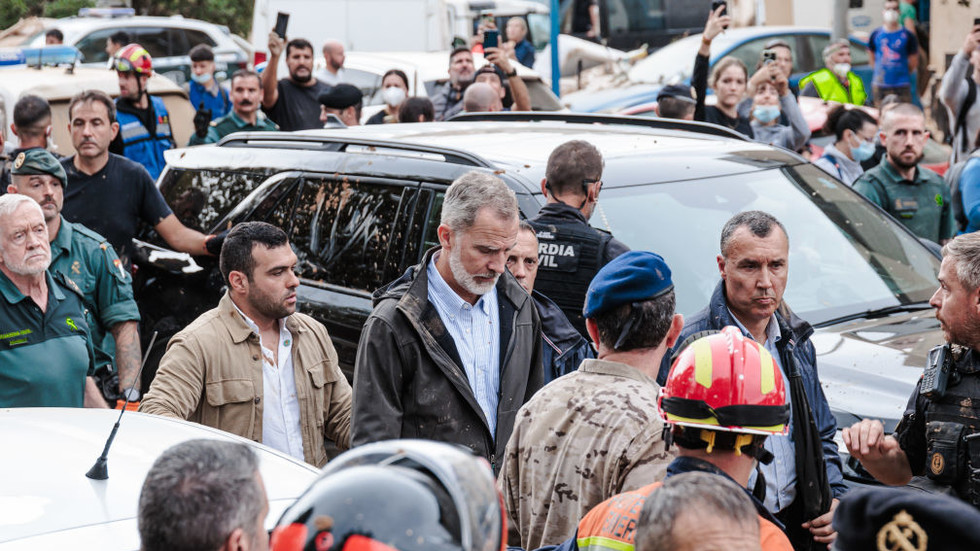On a day marked by both tragedy and tension, Spain’s King Felipe VI and Queen Letizia faced a surge of anger from flood survivors during their visit to the disaster-struck town of Paiporta, Valencia. This region has been severely impacted by catastrophic floods that claimed the lives of over 200 people following a torrential downpour on the preceding Monday night. During their visit, the royal couple was accompanied by Prime Minister Pedro Sanchez and the regional president, Carlos Mazon, as they sought to provide support and solidarity to the beleaguered citizens. However, the royal family’s presence was met with hostility as locals expressed their grief and frustration over what they perceived as a lack of adequate response and foresight from the authorities involved in emergency management.
The atmosphere in Paiporta was charged, with some residents vocally protesting against the royal family and government officials. Reports from the Spanish news agency EFE detailed incidents where locals hurled eggs and mud at the royals, while others chanted derogatory remarks like “murderers” and “shame.” This aggressive reception was indicative of a broader sentiment among the residents who felt that their safety had been compromised due to insufficient warnings about the impending floods. As tensions rose, security personnel attempted to protect the royals, using umbrellas for cover amidst ongoing protests that even escalated to stone-throwing directed at the Prime Minister’s vehicle.
Underlying the anger displayed by the residents was a profound sense of betrayal and frustration. Many voiced their belief that the disaster was foreseeable and preventable had there been a more robust early warning system in place. One resident’s outcry encapsulated the mood of the crowd, emphasizing that a warning could have led to greater preparedness and potentially saved lives. This sentiment resonated deeply among the victims’ families and community members, illuminating their desire for accountability from the authorities responsible for disaster management and public safety.
Despite facing hostility, King Felipe and Queen Letizia made commendable attempts to connect with the grieving populace during their visit. In one particularly poignant moment captured on video, the Queen, whose face bore the etchings of mud from the protests, was seen embracing a devastated local woman in an effort to offer comfort. This gesture of compassion reflected the complicated dynamics of royal visits in the wake of disasters, where the royal family often seeks to demonstrate empathy while navigating the emotions of a distressed community. However, the visit resulted in significant disruption, and plans to visit an additional affected town, Chiva, were abruptly canceled in light of the circumstances.
In the hours following the royal visit, King Felipe took to social media to express his understanding of the community’s anger and frustration. He acknowledged the struggles faced by the victims and underscored the state’s commitment to providing assurance and support during this tragic time. His message sought to bridge the gap between the monarchy and the citizens, aiming to convey that the government was present and active in providing help to those affected by the calamity. The king’s communication was an effort to quell the rising discontent and instill a sense of hope among the victims and their families.
In summary, the royal family’s visit to Valencia amidst devastating floods became a flashpoint for community anger against perceived governmental failures. The hostility expressed by the locals towards King Felipe VI and Queen Letizia underscored the urgent need for systemic improvements in disaster preparedness and response. As the region grapples with the aftermath of the tragedy, the contrasting emotions of grief, anger, and the longing for accountability remain palpable within the affected communities. The royals’ attempts to engage with residents, while noble, highlighted the complexities of public sentiment in times of crisis, indicating a critical opportunity for reflection and reform among Spanish authorities to better serve their citizens in the future.

